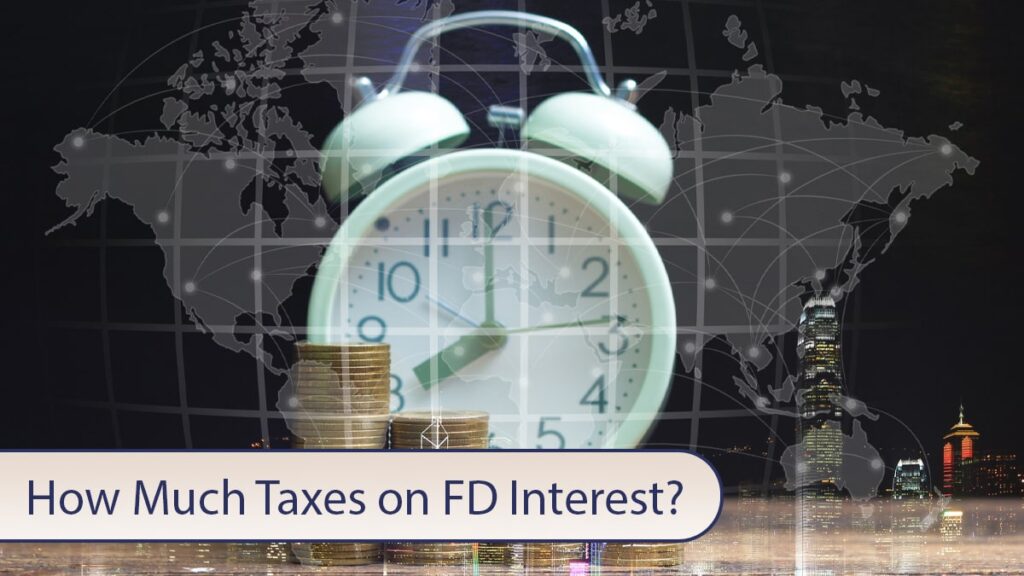The interest you earn on any type of investment account is considered financial gain and subject to taxes unless it is a tax-free product.
Fixed Deposit Interest Rates are no different, the interest earned is subject to taxes and at the end of the financial year, this interest earned has to be shown in your income Tax statement.
This article will explore the taxes you must pay on the FD Interest rate, How Much Tax on FD Interest, TDS calculation for Fixed Deposit, TDS on FD, TDS for Non-Senior Citizens, etc.
But first, let’s find out what is Fixed Deposit

What is a Fixed Deposit?
Fixed Deposit is a savings bank account where you can deposit your funds and generate a fixed income for a fixed tenure.
The interest earned on the FD Deposit is fixed and does not change making it a stable and trustworthy source of income.
You can invest in a Fixed Deposit in any bank or NBFC and earn an attractive interest rate which is often greater than the inflation rate making it profitable for you to save.
The only problem with this is the tax education on the interest earned. Interest earned on the Fixed Deposit is subject to tax deduction essentially making the profit earned on the interest less than what it could have been.
Despite this, FD can be a great way of keeping the money safe and secure, The premature liquidation option is available making it easy for you to withdraw the funds whenever you like.
What is TDS?
The tax on the interest earned on the Fixed Deposit is subject to the Tax Deduction at Source or TDS meaning, the amount that you’ll get will be tax deducted and the remaining amount will be transferred to you. Whatever tax you are liable to pay to the government is taxed at the source of income generation like salary, FD interest, etc. which makes it a full proof taxing system.
TDS on Fixed Deposit
TDS on Fixed Deposit essentially means the fund that you’ve deposited in the FD Account which upon maturity or premature closing of the account will be deducted with tax which you are liable to pay.
The rate of tax depends on your profile and where you’ve opened your account. The following are the different factors that affect the rate of tax on the FD Deposit-
TDS for Bank FD
The tax rate for the TDS is taxed at 10% if the interest earned is less than Rs.40,000/- and if the FD account is for senior citizens, then the non-taxable interest earned is Rs.50,000/-.
TDS for Non-Banking FD
For NBFCs, the taxable limit is Rs.5000/- any interest earned more than Rs.5,000/- is subject to taxation at 10% but if the FD Account holder does not show his/her PAN Card Then the interest rate deduction is 20%.
TDS on NRIs
The FD Taxation rate on the interest earned is 30% for Non-Resident Indian Accounts.
How TDS on FD Interest Earned is Calculated?
Finding out the tax liability before investing in any FD Account can help you create a cost-and-benefit analysis for the investment that want to make.
This way, you’ll be able to find out your profile on investment and evaluate whether an FD Account is profitable for you or not.
It can be best understood using an Example- Suppose, you are making an investment of Rs.20 Lakhs in a Fixed Deposit for a year, then after the maturity, you are withdrawing the funds.
Let’s say, the bank is paying you an interest rate of 7.3% p.a., so the total interest earned over a year is Rs.1.46 Lakhs, which is significantly more than that of Rs.40,000/- tax-free limit.
So, a fixed 10% TDS will be levied on the interest earned. So, 10% of Rs.1.46 Lakhs will be an amount which you’ll be liable to pay tax on. So, the TDS deducted will be Rs.14,600/- and the final amount i.e., Rs.1,31,400/- will be paid back to you.
FAQ
If you do not have a PAN Card, then you’ll have to pay tax on the FD Account at 20% TDS on the interest earned.
Yes. You can get a TDS Certificate from the Bank and is essential for you to show it while filing for annual returns.
Yes, in case you’ve paid excess TDS, then you can claim it back while filing ITR and providing important details.



